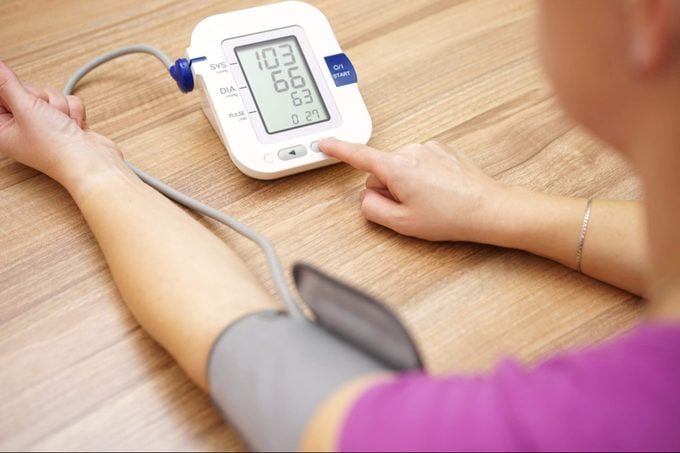7 Amazing Heart Disease Breakthroughs of 2019
Updated: Apr. 21, 2021
Advancements in research, tests, treatments, and prevention strategies have taken a leap forward this year. Here's what you need to know about maintaining the health of your ticker today.
Heart disease remains the number one killer
Your heart should always be on your mind. Heart disease is responsible for one in four deaths, accounting for more than 600,000 deaths every year in the US, according to the Centers for Disease Control and Prevention. Research also shows that heart disease is on the rise in younger adults, especially in women. That’s why it’s critical to celebrate the advancements in research, prevention, and treatment in this deadly disease. Follow these smart ways to prevent heart disease and stroke.
About 104 million adults should monitor their blood pressure at home

If you have borderline hypertension, taking your readings at home is a smart idea, per a new study in the journal Hypertension. That’s because often these patients find getting their blood pressure taken in a doctor’s office stressful, and their readings spike as a result. At home, though, their readings are normal. (This is called “white coat hypertension.”) The opposite also occurs, and people with high blood pressure are missed. These folks on the border should use blood pressure monitors outside of the office, which can help docs decide on exactly who needs medication.
For borderline adults and those already living with hypertension, finding a good blood pressure monitor can be a chore. Still to come this year, in conjunction with the American Medical Association, the AHA will release a list of what are considered validated blood pressure monitors, says Eduardo Sanchez, MD, chief medical officer for prevention at the American Heart Association (AHA). Patients can use this as a list to find the machines that have been tested and verified highly accurate. Watch out for these silent signs of heart trouble.
Vaping is terrible for your heart—and your teen’s
The trend is bad enough in adults, but it’s becoming an alarming epidemic in American teens, says Dr. Sanchez. “We had done such a great job reducing tobacco smoking in young people, but the new issue we’re trying to wrap our arms around is vaping,” he says. In the past two years, rates of e-cigarette use has doubled, per information released in The New England Journal of Medicine in 2019.
Why would taking in more nicotine through a new delivery method be a breakthrough? Public health officials are fast-tracking the message that vaping is dangerous to the public, and the AHA announced in November that they’re making a multimillion-dollar investment into funding research and promoting school and community programs that combat this serious problem. “There’s the false idea that vaping is safer than cigarettes. What we know is that nicotine is a dangerous, addictive drug that isn’t good for your heart,” says Dr. Sanchez. It goes to say that you wouldn’t catch doctors vaping, but these are the 45 other things heart experts do to stay healthy.
Daily aspirin might not be for you after all
This year, the AHA and American College of Cardiology (ACC) released new cardio prevention guidelines that provided clarity on who should and should not take a daily aspirin to prevent a heart attack or stroke. Published in the journal Circulation, “these guidelines are based on new and better studies,” says Dr. Sanchez. Bottom line, he says: If you’ve had a heart attack or stroke, you’re probably taking aspirin now and should continue to do so. If you have not had a history of cardiovascular disease, you shouldn’t be on aspirin unless your doctor prescribes it to you based on other factors (like a family history of early heart disease). Also keep in mind that even baby aspirin has a risk of serious bleeding, so don’t take it regularly unless your doctor recommends it based on your risk factors. For more aspirin know-how, brush up on these 12 times aspirin could be dangerous or ineffective.
A new life-saving device for heart failure patients
A weak heart can’t pump the blood and oxygen your body needs, and heart failure, a life-threatening chronic condition, affects 5.7 million adults in the US, per the CDC. For these patients, there’s new hope: this summer the U.S. Food and Drug Administration approved the Barostim Neo System as a Breakthrough Device. It earned such a designation because it gives patients who do not benefit from standard treatments another option in reducing their symptoms and improving their quality of life. It’s easily inserted and removed under the rib cage. If you don’t know much about heart failure, these are the subtle signs of congestive heart failure.
The link between heart disease risk and cancer
While cardiovascular problems and cancer may seem like two separate diseases, they’re more related than you think. New research published in October 2019 in the European Journal of Preventative Cardiology discovered that a risk factor called microvascular endothelial dysfunction (which involves the lining of tiny blood vessels) was associated with more than twice the odds of developing a solid-tumor cancer. The reason seems to be that inflammatory pathways feed both conditions. Researchers say that this risk factor may be considered one factor in predicting developing this type of cancer.
Multitasking medications for people with type 2 diabetes
As an adult, having type 2 diabetes increases your risk of dying from heart disease by two- to four-fold, reports the AHA. In recent years, the newest class of drugs for diabetes, like SGLT-2 inhibitors and GLP1-RAs, also have heart-protective properties. “These reduce the likelihood of suffering a heart attack, stroke, heart failure, and even kidney disease,” says Dr. Sanchez. That alone was a dramatic breakthrough, but now the evidence has reached a peak such that updated guidelines from the American Diabetes Association indicate that if you’re a person with type 2 diabetes and evidence of cardiovascular disease, these drugs should be your go-to treatment.
A heart-repairing injection
Scientists have just completed a phase 1 clinical human trial of a hydrogel designed to repair heart tissue in patients who have had a heart attack and have ischemic heart failure, the results of which were published in the Journal of the American College of Cardiology: Basic to Translational Science. Called VentriGel, the injectable, derived from pig heart connective tissue, was tested in 15 men two months to three years after they suffered a heart attack. The results show that the hydrogel is safe to use, and seemed to improve symptoms and heart function in these patients. More clinical trials are needed before the injection can be used in a care setting, but it’s one potential step forward. These are the five life-saving tests you really need to detect heart problems.

